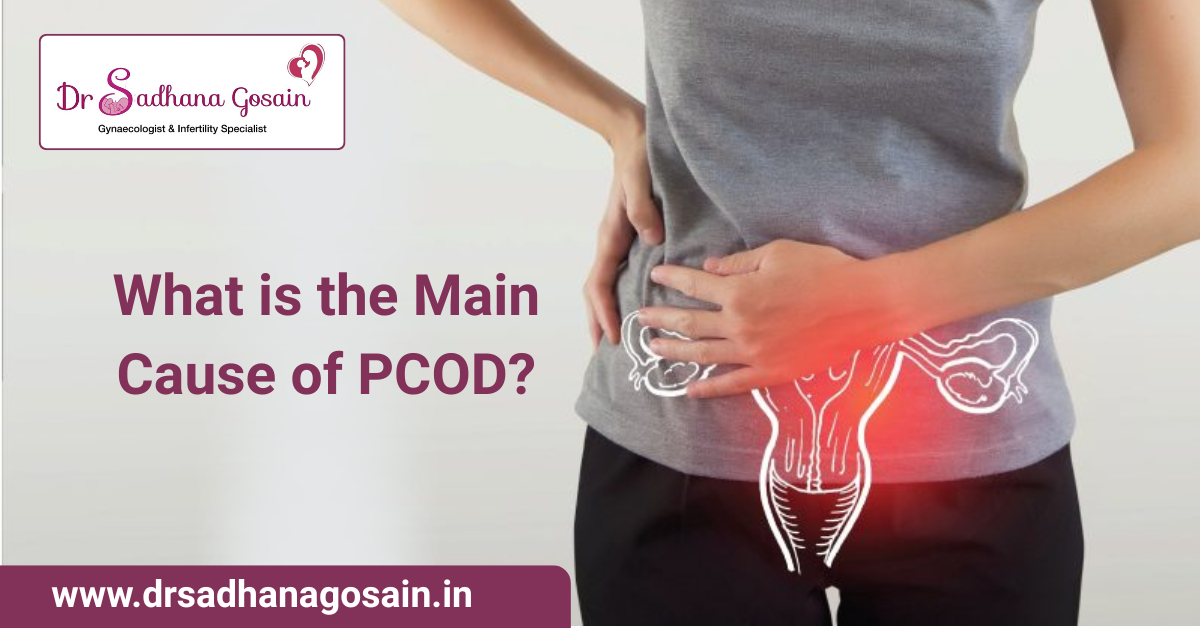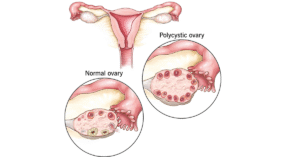
What is the Main Cause of PCOD?

Main Cause of PCOD: Polycystic Ovarian Disease (PCOD) is a common hormonal disorder affecting millions of women across the globe, especially during their reproductive years. Despite its prevalence, many still wonder:
What is the main cause of PCOD? Understanding the root cause is crucial for early diagnosis, effective treatment, and prevention.
What is PCOD?

What is the Main Cause of PCOD
PCOD is a condition where a woman’s ovaries produce immature or partially mature eggs in large numbers. These eggs eventually turn into cysts, leading to hormonal imbalances, irregular periods, weight gain, acne, and fertility issues. PCOD is not the same as PCOS (Polycystic Ovary Syndrome), though the two are often confused. While PCOD is more about ovarian dysfunction, PCOS is a metabolic disorder.
Main Cause of PCOD
The main cause of PCOD is still not completely understood, but several factors contribute to its development:
1. Hormonal Imbalance
An increase in male hormones (androgens) disrupts ovulation. This hormonal imbalance is often considered the main cause of PCOD, as it leads to irregular menstrual cycles, excessive hair growth, and acne.
2. Insulin Resistance
Insulin resistance causes higher insulin levels in the body, which can stimulate the ovaries to produce more androgens. This is why many women with PCOD also suffer from weight gain and type 2 diabetes.
3. Genetic Factors
If your mother or sister has PCOD, there’s a higher chance you might develop it too. Genetics play a significant role in determining your risk, making it another important main cause of PCOD.
4. Lifestyle Factors
Unhealthy eating habits, lack of physical activity, and high-stress levels can worsen symptoms. While not a direct main cause of PCOD, poor lifestyle choices can act as a catalyst.
View this post on Instagram
Symptoms to Watch Out For
-
Irregular periods
-
Excessive facial or body hair
-
Acne or oily skin
-
Weight gain or difficulty losing weight
-
Thinning hair on the scalp
-
Difficulty getting pregnant
If you experience any of these symptoms, it is essential to consult a specialist.
Early Diagnosis is Key
The good news is that PCOD is manageable. Early diagnosis and appropriate treatment can help control symptoms and prevent long-term complications. A qualified Gynecologist in Delhi, like Dr Sadhana Gosain, can provide a personalized treatment plan tailored to your hormonal and metabolic profile.
Conclusion
To sum up, the main cause of PCOD often lies in a combination of hormonal imbalances, genetic predisposition, and lifestyle factors. While there is no definitive cure, timely medical intervention and lifestyle modifications can help manage the condition effectively.
If you’re seeking expert advice or treatment, consulting a reputed Gynecologist in Delhi like Dr Sadhana Gosain is a wise step toward better reproductive health.
Also Read:
Frequently Asked Questions (FAQs) About Main Causes of PCOD
1. What is the main cause of PCOD?
The main cause of PCOD is believed to be hormonal imbalance, particularly elevated levels of androgens (male hormones) and insulin resistance. Genetics and lifestyle factors also play a significant role in the development of PCOD.
2. Is PCOD a serious problem?
PCOD is not life-threatening, but if left untreated, it can lead to complications like infertility, type 2 diabetes, obesity, and heart disease. Early diagnosis and proper medical care are essential to manage the condition.
3. Can PCOD be cured permanently?
PCOD cannot be “cured” permanently, but it can be effectively managed through lifestyle changes, medication, and hormonal therapy. Regular checkups with a Gynecologist in Delhi like Dr Sadhana Gosain can help maintain hormonal balance and reduce symptoms.
4. What are the early signs of PCOD?
Early signs include:
-
Irregular periods
-
Acne and oily skin
-
Excessive hair growth
-
Weight gain
-
Difficulty in conceiving
If you notice these symptoms, consult a specialist to investigate the main cause of PCOD in your case.
5. Is weight gain a symptom or a cause of PCOD?
Weight gain is both a symptom and a contributing factor to PCOD. Being overweight can increase insulin resistance, which may worsen the hormonal imbalance and symptoms.
6. Can PCOD affect fertility?
Yes, PCOD can cause irregular ovulation, which impacts fertility. However, with medical guidance and lifestyle adjustments, many women with PCOD can conceive naturally or with assistance.
7. What lifestyle changes help manage PCOD?
-
Eat a balanced, low-sugar diet
-
Exercise regularly
-
Manage stress
-
Get enough sleep
-
Maintain a healthy weight
These changes can help address the main cause of PCOD and improve your overall well-being.
8. How is PCOD diagnosed?
Doctors typically diagnose PCOD through a combination of:
-
Medical history review
-
Physical examination
-
Blood tests for hormone levels
-
Pelvic ultrasound to check for cysts on ovaries

